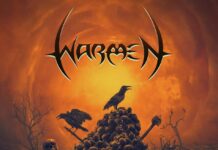The time has come! ELUVEITIE had what seemed to be a rather rough division in members last year, resulting in the formation of CELLAR DARLING and in ELUVEITIE revealing a vast new line-up. Not only have fans been waiting to hear what this new mix would sound like, but “Evocation II” has been a long time in the making, with ELUVEITIE having released a whopping three albums since its predecessor in 2009, “Evocation I: The Arcane Dominion.”

The album starts with the sound of a light wind, accompanied by looming music and the invocation, which you can read about in our interview with Glanzmann to get the translation of the welcome. It’s short and sweet though, going straight into the second track. The first release was titled “Epona,” and it is worth noting that they already have a song called “A Rose for Epona.” One has to assume though, that the newer song is about the goddess herself, while the elder is more a tragic song about faith and the diminishing thereof, so I can easily forgive the repetition. Epona is not simply the name of the horse in The Legend of Zelda – that series did name her appropriately though, as Epona is the guardian of horses, mules, donkeys, and ponies.
The first impression I had of the song, and the new line-up as a whole, is one I expect that many of you shared: “… That’s just not Anna Murphy.” Murphy – the former hurdy-gurdy player and vocalist, for those of you a few steps behind – was very well beloved by fans, and her departure probably stung a bit more than many other departures in recent years. However, on my second listen to the song, the shock of the change had already passed and I was able to appreciate the song in its entirety, and the impression it left was overwhelmingly positive. In fact, it would be a disservice to say that Fabienne Erni‘s voice is not lovely. It is merely different from Murphy‘s. I’d actually consider her a very nice replacement, all things considered, though she lacks a bit of Murphy‘s heart.
“Svcellos II” is the first of two sequel tracks on the album, in this case referring to “Origins” (2014). At this point, as someone who is only familiar in passing with the Celtic pantheon, I’m quite certain that I’ll only be able to scratch the surface of this album’s concept. The song itself features a soft, whispering intro, slightly eerie but still hopeful, featuring flutes/whistles. It transitions very smoothly into “Nantosvelta,” which introduces more instruments. This is a neat pairing, as Sucellos and Nantosuelta are partners in the pantheon, so the fact that their songs nearly blend into one is perfect. There are some soft female spoken parts towards the end in Gaulish, of course. The song kicks off into a quicker, dancing pace about two thirds of the way it, making for a lively and fun track overall. Sucellos is often portrayed as a middle-aged bearded man with a hammer (or beer keg on a pole) and is associated with wine and agriculture, while Nantosuelta is the goddess of earth, fire, and fertility.
A hurdy-gurdy drone, accompanied by female spoken words, makes up the entirety of “Tovtatis,” the tribal protector. “Lvgvs” is the other advanced release track from the album. It continues the trend of sweet and powerful vocals from Erni, though I have to say that vocally, this track is rather repetitive. It appears to be limited to a verse or two and then a chorus that is repeated more or less until the end, and while the music is incredibly bright and catchy, the song does get a bit old after a while, working better as a background track than something to listen to actively. As a god, Lugus is considered to be similar to or the same as Mercury in the Roman pantheon.
An interesting change from there, Grannus was known for sun, spas, and healing springs (hot springs, I suppose). “Grannos” has a mid-tempo, gentle feel to it, with a lot of flutes and possibly violin. I do confess that I have a bit of trouble pinpointing which instrument I’m hearing, so do take my thoughts with a grain of salt – these guys blend instruments masterfully. There is some light guitar in there back as well. Like “Nantosvelta,” it kicks up into a faster reel about two thirds of the way through, into a cheerful and quick, dance-able tune.
The horned god, Cernunnos, represented the underworld, as well as wealth, life, animals, and fertility. Spoken female words open his song with some gentle harp to follow before the rest join in. It’s a very peaceful and soft song and avoids sounding ominous or melancholic, like one might expect of an underworld deity. There is a beautiful violin part that is paired with a scream from Glanzmann that holds a certain power. If you want something a bit creepier and more ominous, the following track, “Catvrix” will definitely satiate that desire. With both eerie lower vocals from Glanzmann and wild higher vocals from Erni, as well as a strong drum presence, this tribute to the war god sounds exactly like you might expect it to.
The bear goddess is none other than “Artio,” and the pattering of rain and female vocals open her song, contrasting starkly with the previous, more aggressive track. Rather than using instruments, this track uses wind in the woods and other ambient noises to emphasize the vocals, only adding in a low drone around 2 minutes in. The instruments only enter into the picture towards the very end for a short moment.
I had a much harder time finding any information on Aventia than most of the others, but what I did learn was that she was associated with Grannus. The song is a rather pretty one though, with flute in the forefront before the violin kicks in about halfway through, sounding like a traditional Celtic fiddle tune (which I’m sure it must be – Glanzmann has never shied away from using traditional tunes) – props to Nicole Ansperger for her performance!. There is a whisper of a scream in the background, though on the whole, this track remains lyric-free.
“Ogmios” was immediately a familiar track to me for several reasons, and should be to you for at least one reason: it’s an alternate version of the same tune that founded ELUVEITIE‘s “Inis Mona” back in 2008. My history with this song involves a friend from the Celtic region of France informing me that this is a old Celtic song, and she played me a French version in the traditional manner. Some time later, I came across “Tri Martolod” by Nolwenn Leroy.
This version is extremely similar to the new ELUVEITIE version, though ELUVEITIE‘s version has an incredible little breakdown about three quarters of the way through, and is also sung in what I must assume is Gaulish, since it’s not French. I’d love to hear some history on how this tune made it into “Inis Mona” and why they chose to reuse it now. Ogmios is the god of eloquence. You may also recognize his name from the “Origins” album.
Moving on from that, we reach “Esvs.” Not much is known of this particular god, though he is always portrayed trimming branches from trees with an axe. The song has some tapping sounds within, as well as a blend of chants that slowly evolve into vocals. It is haunting, in a beautiful way. The vocals toward the end get particularly interesting, with the lead switching back and forth with a… I don’t exactly want to call it a choir, but some group vocals. “Antvmnos” was another god I couldn’t find much of anything about online, though it is cited several times on the “Origins” album and may be associated with Annwn. The song is a very sweet and lovely piece, with flutes and harp creating a lovely ambiance.
The second sequel of the album, “Tarvos II,” has the pipes at the forefront, helping it stand out a bit from the others, and reflects all the way back again to “Slania,” where one will find the original “Tarvos.” The drums are also noteworthy on this track, which may relate to his depiction as a bull with three cranes on his back. He can be found in one of the same images as Esus.
The “fair shining one,” Belenus, was the patron deity of ancient Roman city, Aquileia. “Belenos” combines soft flutes and background ambient noise to create yet another on the long list of lovely tracks on this album. The shaman drums are again very gentle and pleasant, and at this point I really need to give a shout out to Merlin Sutter‘s replacement, Alain Ackermann, for his performance. Of course, everyone wants a thunder god, and that’s where “Taranis” comes in. The music almost sounds like a clashing of a storm, with violin in the back as the flutes take off and soar. This bright and lively song is less like the hyper-macho depictions of Thor, and avoids any and all stereotypes and preconceptions, maintaining a strong Celtic sound. The vocals are a bit odd in this track, reminding me of the effect they used on dark Galadriel in Fellowship of the Ring.
The album ends with “Nemeton,” which to my knowledge was more of a sacred ritual space, as opposed to a deity. The song indeed feels more like a place than a person, and lasts less than 2 minutes, working effectively as an outro to the adventure that was this album.
Much like “Evocation I: The Arcane Dominion,” this album still has an issue with songs not standing alone very well; however, I also wanted to make it clear that this album is definitely a step up thematically, musically, and potentially even vocally from its predecessor. If you enjoy ELUVEITIE and in particular, the previous “Evocation” album, I would find it hard to believe that you wouldn’t enjoy this one as much, if not more. Some might hold back their appreciation due to the loss of Murphy on vocals, but I would consider that foolish – Erni (and the others, for that matter) have certainly earned their place in the band and then some on this album.
Written by Bear Wiseman
Musicalypse, 2017
OV: 5351
Tracklist
- Dvressu
- Epona
- Svcellos II (sequel)
- Nantosvelta
- Tovtatis
- Lvgvs
- Grannos
- Cernvnnos
- Catvrix
- Artio
- Aventia
- Ogmios
- Esvs
- Antvmnos
- Tarvos II (sequel)
- Belenos
- Taranis
- Nemeton
Lineup
Chrigel Glanzmann – growling vocals, mandola, whistles, pipes, gaita, acoustic guitar, bodhrán, harp
Kay Brem – bass
Rafael Salzmann – lead guitar
Nicole Ansperger – violin, backing vocals
Matteo Sisti – bagpipes, whistles, mandola
Alain Ackermann – drums
Jonas Wolf – rhythm guitar
Michalina Malisz – hurdy-gurdy
Fabienne Erni – vocals, celtic harp, mandola
Label
Nuclear Blast Records
Links
Recent posts
[recent_post_carousel design=”design-1″]




